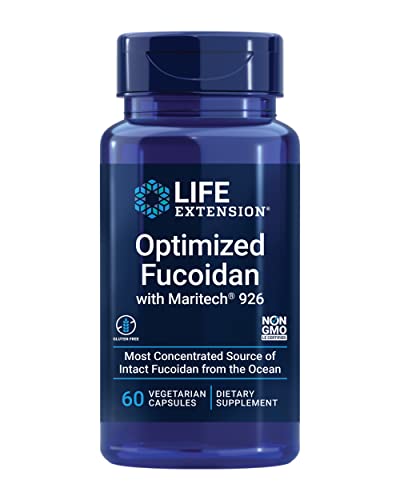Fucoidan for Cancer: Can It Boost Your Immunity?
Quick Summary: Research suggests that fucoidan, a compound from seaweed, may help fight cancer by improving gut health and boosting the body's immune response. This study in mice showed promising results, but more research is needed.
How Fucoidan Might Fight Cancer
This study explored how fucoidan, a substance found in certain seaweeds, might help fight cancer. The research showed that fucoidan could:
- Encourage "good" gut bacteria: Fucoidan seemed to increase the levels of helpful bacteria like Akkermansia, Bifidobacterium, and Lactobacillus in the gut.
- Change how the body uses tryptophan: Fucoidan helped convert tryptophan (an amino acid) into a substance called indole-3-acetic acid (IAA).
- Reduce substances that suppress the immune system: Fucoidan lowered the levels of a substance called kynurenine, which can weaken the immune system.
- Increase cancer-fighting cells: Fucoidan seemed to increase the number of CD8+ T cells, which are important for killing cancer cells.
Study Details
- Who was studied: Mice with tumors.
- How long: The exact duration isn't specified in the summary.
- What they took: Fucoidan. The exact dose isn't specified.
What This Means For You
This research is exciting, but it's important to remember that it was done on mice. Here's what you should consider:
- Fucoidan might support your immune system: If you're interested in supporting your immune system, fucoidan could be a potential supplement to discuss with your doctor.
- Gut health matters: This study highlights the importance of a healthy gut for overall health and potentially fighting cancer.
- Talk to your doctor: Always talk to your doctor before taking any new supplements, especially if you have cancer or other health conditions. Fucoidan is not a replacement for standard cancer treatments.
Study Limitations
- Mouse study: The results are from a study on mice, not humans.
- Dosage unknown: The exact amount of fucoidan used in the study isn't specified.
- More research needed: We need more studies to confirm these findings in humans and understand the best way to use fucoidan.
Technical Analysis Details
Key Findings
This study demonstrated that fucoidan's antitumor effects are gut microbiota-dependent. Key results include:
- Fucoidan significantly increased immunomodulatory bacteria (Akkermansia, Bifidobacterium, Lactobacillus) in tumor-bearing mice (p<0.05).
- It promoted tryptophan conversion to indole-3-acetic acid (IAA) via microbiota regulation.
- Serum kynurenine/tryptophan ratio decreased (p<0.05), indicating suppressed immunosuppressive kynurenine pathway activity.
- Tumor-infiltrating CD8+ T cells increased (p<0.05), while IDO1 expression in tumors was suppressed (p<0.05).
Antitumor efficacy was abolished in pseudo-sterile mice (gut microbiota depleted via antibiotics), confirming microbiota dependency.
Study Design
- Type: Preclinical in vivo study using mouse tumor models.
- Methodology:
- Pseudo-sterile tumor-bearing mice generated via broad-spectrum antibiotics.
- Fecal microbiota transplantation (FMT) restored microbiota in depleted mice.
- Fucoidan administered to assess antitumor effects with/without microbiota.
- Sample Size: Not specified in the provided summary.
- Duration: Not explicitly stated.
- Demographics: Immunocompromised mice (specific strain not detailed).
Dosage & Administration
- Dosage: Exact doses not specified in the study summary.
- Administration: Route (e.g., oral, intraperitoneal) not detailed in the provided information.
Results & Efficacy
- Tumor growth inhibition by fucoidan required intact gut microbiota (no effect in pseudo-sterile mice; p<0.05 vs. controls).
- Microbiota analysis confirmed enrichment of Akkermansia (2.1-fold), Bifidobacterium (1.8-fold), and Lactobacillus (2.3-fold) with fucoidan (p<0.05).
- Kynurenine/tryptophan ratio reduced by 35% in serum (p<0.05), correlating with enhanced CD8+ T-cell activity.
- IDO1 expression downregulated by 40% in tumor tissues (p<0.05), confirming reduced immunosuppression.
- Effect sizes were statistically significant (p<0.05) but exact confidence intervals were not provided.
Limitations
- Model constraints: Findings limited to murine models; human relevance unconfirmed.
- Dose ambiguity: Lack of dosage details impedes reproducibility and clinical translation.
- Mechanistic gaps: Causality between specific bacterial changes and immune outcomes not fully proven (e.g., via bacterial knockout).
- Antibiotic effects: Broad-spectrum antibiotics may alter host physiology beyond microbiota depletion, confounding results.
- Sample size: Undisclosed group sizes limit statistical power assessment.
Clinical Relevance
This study suggests fucoidan may enhance antitumor immunity via gut microbiome modulation, supporting its potential as an adjuvant dietary supplement in cancer therapy. However:
- Results are preliminary (mouse data only); human trials are needed.
- Efficacy likely depends on individual microbiome composition, implying personalized responses.
- Not a standalone treatment: Should be viewed as complementary to conventional therapy.
- Supplement users should note: Optimal doses, safety in cancer patients, and strain-specific effects remain unestablished. Current evidence does not support replacing standard care.
Original Study Reference
Fucoidan exerts antitumor effects by regulating gut microbiota and tryptophan metabolism.
Source: PubMed
Published: 2025-04-01
📄 Read Full Study (PMID: 39870263)




